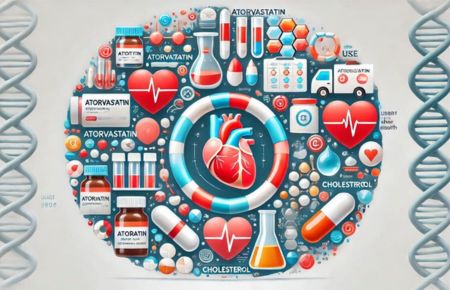As per the report, 24,493,971 Americans are actively using various methods to prevent high cholesterol levels. Atorvastatin, a commonly prescribed medication, plays a crucial role in managing cholesterol levels and reducing the risk of heart disease. Understanding its mechanisms, benefits, usage, and considerations is essential for individuals seeking to maintain cardiovascular health.
Understanding the Purpose of Atorvastatin
- Atorvastatin belongs to the class of medications known as statins, which are primarily aimed at lowering LDL (low-density lipoprotein) cholesterol levels while increasing HDL (high-density lipoprotein) cholesterol levels, commonly referred to as “good” cholesterol.
- By targeting LDL cholesterol, atorvastatin helps prevent the accumulation of plaque in the arteries, thereby reducing the risk of cardiovascular events such as heart attacks and strokes.
Mechanism of Action: How Atorvastatin Works
- Atorvastatin works by inhibiting an enzyme called HMG-CoA reductase in the liver. This enzyme plays a pivotal role in the production of cholesterol within the body.
- By blocking HMG-CoA reductase, atorvastatin reduces the liver’s ability to produce cholesterol, leading to decreased levels of LDL cholesterol circulating in the bloodstream.
Exploring the Benefits of Atorvastatin
- Numerous studies have demonstrated the significant benefits of atorvastatin in reducing the risk of cardiovascular events, particularly in individuals with elevated cholesterol levels or pre-existing cardiovascular conditions.
- In addition to lowering LDL cholesterol, atorvastatin may also help stabilize plaque within the arteries, thus decreasing the likelihood of plaque rupture and subsequent blood clot formation.
Proper Usage and Considerations
- Atorvastatin is typically prescribed to individuals with elevated cholesterol levels, especially those with a history of cardiovascular disease, diabetes, or hypertension.
- The medication is usually taken orally in the form of tablets, with dosages tailored to individual cholesterol levels and medical history.
- While atorvastatin is generally well-tolerated, some individuals may experience side effects such as muscle pain, liver abnormalities, or gastrointestinal disturbances. Patients must communicate any concerns or potential side effects with their healthcare provider to ensure proper management and adjustment of treatment as needed.
Atorvastatin plays a pivotal role in maintaining cardiovascular health by effectively lowering LDL cholesterol levels and reducing the risk of heart disease. By understanding its purpose, mechanism of action, benefits, proper usage, and potential considerations, individuals can make informed decisions in collaboration with their healthcare providers to promote heart health and overall well-being.
A big thank you for exploring MHNRC.ORG Your visit means a lot to us, and we’re grateful for your time on our platform. If you have any feedback or suggestions, we’d love to hear them. Looking for


